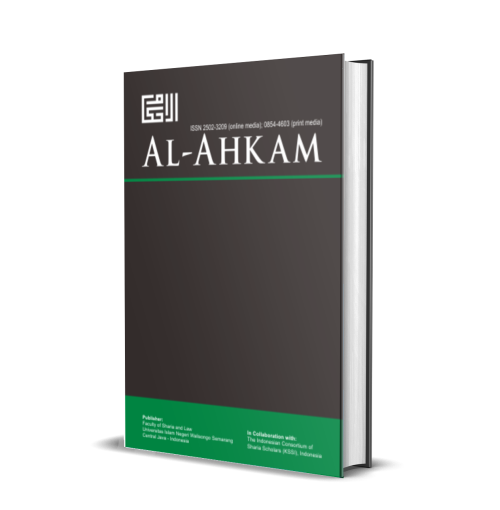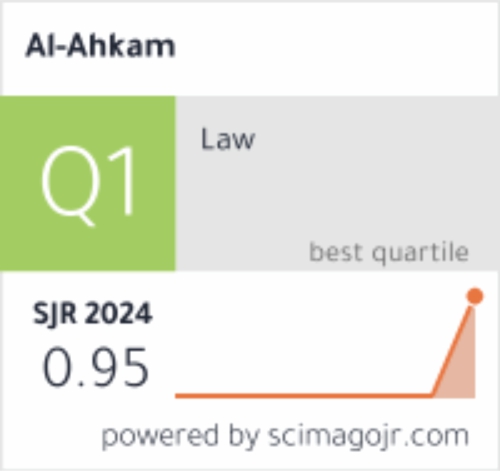Khuruj and Family Economic Resilience: Study on Jama’ah Tabligh Family in Medan City
DOI:
https://doi.org/10.21580/ahkam.2019.29.1.3087Keywords:
khuruj, economic resilience, Jama’ah TablighAbstract
Khuruj for preach by leaving the family is a must for every member of Jama’ah Tabligh (JT). When khuruj time, JT members cannot conduct their duty as head of the interested household especially to fulfill family economic needs. It is often, they khuruj without leaving enough provision of needs for their family. It is understandable why JT members are often accused as a group that neglects their family not even caring for the family. This research objective is to analyze survival strategy and tactics of the JT family by using a qualitative method. The researcher will conduct an in-depth interview with JT members and their family. Through this field research is found that 1) JT family has a strong belief that their sustenance is the gift of God. 2) Provision of needs that is left by the husband is enough to be utilized as long as being managed with sincerity. 3) JT family has a special survival strategy. So, khuruj is a method of da’wah that does not disturb family economic resilience.Downloads
References
Amin, Edi. “Dakwah Rahmatan li Al-‘Alamin Jamaah Tabligh di Kota Jambi.” Jurnal Komunikasi Islam 2, no. 01 (2012).
al-Anshary, Shodruddin Ámir. Syaikh Mohammad Ilyas dan Da’wah Keagamaannya. Lahore Pakistan: Zakariyya, n.d.
Bustamam-Ahmad, Kamaruzzaman. “The History of Jama’ah Taligh in Southeast Asia: The Role of Islamic Sufism in Islamic Revival.” al-Jāmiʼah: Journal of Islamic studies. 46, no. 2 (2008): 353–400.
Elahi, Maulana Ashiq. Enam Prinsip Tabligh. Pulau Pinang: HM. Yaqoob Ansari Dewan Pakistan, 1979.
Irwan, Irwan. “Strategi Bertahan Hidup Perempuan Penjual Buah-buahan (Studi Perempuan di Pasar Raya Padang Kecamatan Padang Barat Kota Padang Propinsi Sumatera Barat).” Humanus 14, no. 2 (2015): 183. https://doi.org/10.24036/jh.v14i2.5685.
Mahfuzh, Ahmad Najib. Menyingkap Tabir Kesalahpahaman terhadap Jamaah Tabligh. Yogyakarta: Penerbit Ash-Shaff, 1997.
Nadwi, Sayyid Abul Hasan Ali. Riwayat Hidup dan Usaha Dakwah Maulana Muhammad Ilyas. Yogyakarta: Penerbit Ash-Shaff, 1999.
Nur Dyah Gianawati. “Strategi dan Makna Bertahan Hidup Perempuan Pedesaan Etnis Madura dan Jawa (Kajian pada Perempuan Pedesaan etnis Madura di Desa Sumbersalak Kecamatan Ledokombo dan etnis Jawa di Desa Tanjungrejo Kecamatan Wuluhan Kabupaten Jember Propinsi Jawa Timur).” Jember, n.d.
Nur Hidayah. “Strategi Bertahan Hidup Pedagang Asongan di Stasiun Lempuyangan Yogyakarta dan Balapan Solo.” Dimensia: Jurnal Kajian Sosiologi 2, no. 2 (2008).
Razak, Yusran. “Jamaah Tabligh: Ajaran dan Dakwahnya.” UIN Syarif Hidayatullah, 2008.
Shahab, An-Nadhr Muhammad Ishaq. Khuruj fii Sabilillah: Sarana Tarbiyah Umat untuk Membentuk Sifat Imaniyyah. Bandung: Zaad Al-Ma’ad, n.d.
Yatim, Badri. “Jama’ah Tabligh.” In Ensiklopedi Islam. PT Ichtiar Baru Van Hoeve, 2005.
Interview with member of JT who lives in Bumi Asri Medan on 2 September 2018.
Interview with Ummu Irsyad on Tuesday, 28 August 2018 at Pesantren Usman Bin Affan Lau Dendang.
Interview with Ahmad on 2 September 2018 at Masjid Muhajirin Bumi Asri Medan.
Interview with Ummu Hafsah on Tuesday, 28 August 2018 at Pesantren Usman Bin Affan Lau Dendang.
Downloads
Published
How to Cite
Issue
Section
License
By submitting an article to the journal, the author(s) agree to transfer the published article's copyright to the journal, which will act as the publisher. This means the journal will have the right to publish the article in various forms, including reprints. The journal will maintain the publishing rights to the published articles.
In line with the license, authors and third parties (readers, researchers, and others) are allowed to share and adapt the material. In addition, the material must be given appropriate credit, provided with a link to the license, and indicated if changes were made. If authors remix, transform or build upon the material, authors must distribute their contributions under the same license as the original.




